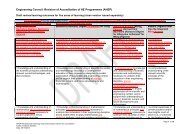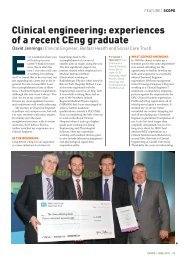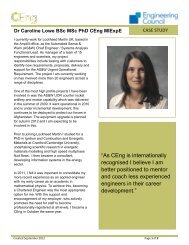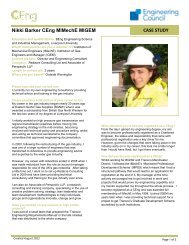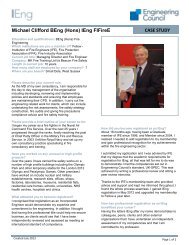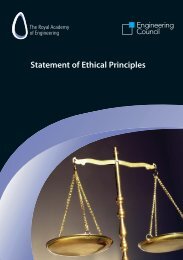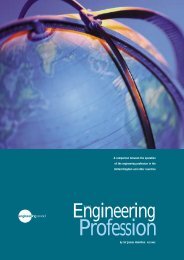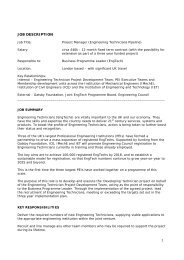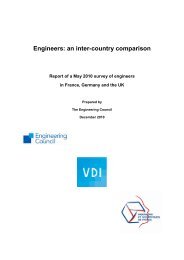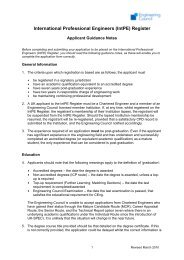An Engine for Change - A Chronicle of the Engineering Council
An Engine for Change - A Chronicle of the Engineering Council
An Engine for Change - A Chronicle of the Engineering Council
You also want an ePaper? Increase the reach of your titles
YUMPU automatically turns print PDFs into web optimized ePapers that Google loves.
1996-1998: THE RUDGE YEARS 119<strong>Engine</strong>ering Institutions (PEIs). It was intended that, based on <strong>the</strong> Institution <strong>of</strong> Civil<strong>Engine</strong>ers’ success with its own regional centres, a new regional network <strong>of</strong> 15 PEIsmanaged by Institutions would take over from <strong>the</strong> EngC creating considerable financialsavings. Pan-Institution committees were created to co-ordinate joint venture projects on aregional basis. A named Institution was to be responsible <strong>for</strong> <strong>the</strong> PEI in each region involvingall members <strong>of</strong> all Institutions in that region, but un<strong>for</strong>tunately <strong>the</strong> Regional Affairs IWG wasunable to indicate how savings could be made. The <strong>of</strong>ficial line, published also in <strong>the</strong> 1996<strong>An</strong>nual Report, claimed that “no vacuum had been left”, a comment vigorously challenged bymany individual Registrants and o<strong>the</strong>rs. PR support came from London with each regiondetermining its own contribution to <strong>the</strong> Corporate Mission. This was nominally put into placein 1997, in an attempt to bring <strong>the</strong> pr<strong>of</strong>ession, schools and industry toge<strong>the</strong>r and encouragebright young people into <strong>the</strong> pr<strong>of</strong>ession. Sadly this was to fail in most regions, apart fromWales and East <strong>An</strong>glia, due to inter-Institution rivalry and lack <strong>of</strong> commitment and resources.The EngC regional <strong>of</strong>fices closed during 1997, so reducing <strong>the</strong> ‘Direct CharitableExpenditure’.Bernard Dawkins a <strong>for</strong>mer EngC Executive Officer and a perceptive and enthusiastic longterm worker <strong>for</strong> <strong>the</strong> engineering education observes:“As a <strong>for</strong>mer elected member <strong>of</strong> a leading IEE Management committee, I found <strong>the</strong> membershad NO knowledge or understanding <strong>of</strong> <strong>the</strong> work and role <strong>of</strong> <strong>the</strong> <strong>Engine</strong>ering <strong>Council</strong>. …In<strong>the</strong> field, amongst <strong>the</strong> PEIs <strong>the</strong>re was a growing feeling that <strong>the</strong> Institutions alone could notlead <strong>the</strong> engineering pr<strong>of</strong>ession and that <strong>the</strong>re was a need <strong>for</strong> leadership from “<strong>the</strong> centre”, i.e.<strong>the</strong> <strong>Engine</strong>ering <strong>Council</strong>. The withdrawal <strong>of</strong> funding from hosting <strong>of</strong> a number <strong>of</strong> PEIs by <strong>the</strong>ICE, in <strong>the</strong> later 1990s suggests that <strong>the</strong> Institutions left alone do not all pull in <strong>the</strong> samedirection.”Again, regarding <strong>the</strong> PEI in Nor<strong>the</strong>rn Ireland, Pr<strong>of</strong>essor Sir Bernard Crossland, who hadgiven sterling service as an EngC <strong>Council</strong> Member, writes:“In Nor<strong>the</strong>rn Ireland we had a most effective ECRO, which was supported by <strong>the</strong> Nor<strong>the</strong>rnIreland Training and Employment Agency. It provided a suite <strong>of</strong> <strong>of</strong>fices and committeerooms in <strong>the</strong> Dundonald Training Centre, and contributed to <strong>the</strong> cost <strong>of</strong> a secretary. We alsohad a CPD Officer, Bill Cousins. As a consequence <strong>the</strong> local branches <strong>of</strong> <strong>the</strong> engineeringInstitutions worked well toge<strong>the</strong>r, and developed close collaboration. We published an annualyearbook <strong>of</strong> events, addresses and one or two articles, all paid <strong>for</strong> by advertising, which wentto each Registrant, Universities, Technical Colleges, schools and Public Libraries. We alsopublished and circulated monthly posters <strong>of</strong> events and courses. The <strong>of</strong>fice was <strong>the</strong> centre <strong>for</strong><strong>the</strong> YEB programme in Nor<strong>the</strong>rn Ireland, which was considered to have been mostsuccessful. With <strong>the</strong> creation <strong>of</strong> <strong>the</strong> ‘Re<strong>for</strong>med’ <strong>Engine</strong>ering <strong>Council</strong> all support <strong>for</strong> <strong>the</strong>ECROs was withdrawn, and as a result <strong>the</strong> Training and Employment Agency withdrew itsmatching funding.“The PEI in Nor<strong>the</strong>rn Ireland, which supplanted <strong>the</strong> ECRO and was supposed to be supportedby <strong>the</strong> ICE was stillborn, and after <strong>the</strong> last Prestige lecture it has finally died. I am supposedto be its Patron, and when I think <strong>of</strong> what we had <strong>for</strong>merly I could weep.“With <strong>the</strong> death <strong>of</strong> <strong>the</strong> ECRO I think that most engineers in Nor<strong>the</strong>rn Ireland have becomecompletely disillusioned with <strong>the</strong> ‘Re<strong>for</strong>med’ <strong>Engine</strong>ering <strong>Council</strong>, and I guess this appliesequally to <strong>the</strong> Training and Employment Agency.”© <strong>Engine</strong>ering <strong>Council</strong> UK 2004



